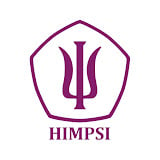The Relationship of Loneliness and Internet Addiction To Psychological Well-Being in Adolescents
Abstract
This study aims to see the relationship between loneliness and internet addiction with the psychological well-being of adolescents in the Greater Jakarta area who actively use the internet. The sampling technique used accidental sampling technique and the sample in the study consisted of 232 adolescents aged 13-21 years. The measuring instrument used is the UCLA Scale Version 3 (University of California Los Angeles Loneliness Scale Version 3) compiled by Rusell (1996), the IAT Scale (Internet Addiction Test) compiled by Young (1998) and the PWB Scale (Psychological Well Being Scale) compiled by Ryff (1995). The results of this study showed that there was no significant relationship between loneliness and psychological well-being and there was no relationship between internet addiction and psychological well-being. However, there is a relationship between loneliness and internet addiction among adolescents.
Keywords
Full Text:
PDFReferences
Adit, A. (2020). 12 Aplikasi Pembelajaran Daring Kerjasama Kemendikbud, Gratis! Kompas.com. Retrieved Februari 18, 2021, from https://edukasi.kompas.com/read/2020/03/22/123204571/12-aplikasi-pembelajaran-daring-kerjasama-kemendikbud-gratis?page=all
Baghaei, N., Tosi, M. S., Rofogar, G. K., & Nezhad, G. K. (2019). Developing a Structural Model of Psychological Well-Being Based on Fear of. Iranian journal of educational Sociology, Volume 2, No 3.
Bhagchandani, R. K. (2017). Effect of Loneliness on the Psychological Well-Being of. International Journal of Social Science and Humanity, Vol. 7, No. 1.
Cahyadi, M. D. (2019). Loneliness and Psychological Well-Being on International Students. Psychological Research and Intervention, 2(2), 43-54. Retrieved from http://journal.uny.ac.id/index.php/pri
Cardak, M. (2013). Psychological Well-Being and Internet Addiction Among University Student. The Turkish Online Journal of Educational Technology, 12 issuee 3.
Dianovinnia, K. (2018, Juni). Depresi pada Remaja: Gejala dan Permasalahannya. Jurnal Psikogenesis, Volume 6, No.1.
Distina, P. P., & Kumail, M. H. (2019). Pengembangan Dimensi Psychological Well-Being Untuk Pengurangan Resko Gangguan Depresi. Jurnal Dakwah dan Pengembangan Sosial Kemanusiaan, Vol. 10, no. 1, 39-59. doi:https://doi.org/10.32923/maw. v10i1.768
Dundu, A. E., Indra, C. M., & Kairupan, B. R. (2019). Hubungan Kecanduan Internet dengan Depresi Pada Pelajar Kelas XII di SMA Negeri 9 Binsus Manado Tahun Ajaran 2018/2019. Jurnal Medik dan Rehabilitasi (JMR), 1 No 3.
Ekinci, N. A., Yalcin, I., & Ayhan, C. (2019). Analysis of Loneliness Levels and Digital Game Addiction of Middle. World Journal of Education. doi:https://doi.org/10.5430/wje. v9n1p20
Ericson, E. H. (1968, Oktober). Iidentity Youth and Crisis (Vol. Vol. 2 No. 1). New York, London: W. W. NORTON & COMPANY.
Fayaz, I. (2020). Internet Addiction in School Going Adolescents and Its relationship with Loneliness. Journal of Psychiatry and Psychology Research, 3(5), 260-265.
Gik. (2014). Sahrul Nekat Gantung Diri, Keluarga: Dia Merasa Dikucilkan Kawan-kawannya. Mojokerto: Detik.Com. Dipetik Mei 02, 2020
Gravetter, F. J., & Wallnau, L. B. (2016). Statistics for the Behavioral Sciences (10th ed.). Canada: Cengage Learning.
Indra, C. M., Dundu, A. E., & Kairupan, B. R. (2019). Hubungan Kecanduan Internet dengan Depresi Pada Pelajar Kelas XII di SMA Negeri 9 Binsus Manado Tahun Ajaran 2018/2019. Jurnal Medik dan Rehabilitasi (JMR), 1 Nomor 3.
Krismawati, Y. (2014). Teori Psikologi Perkembangan Erik H. Erikson dan Manfaatnya. Teologi dan Pendidikan Agama Kristen, 2 No.1, 45-46.
Latipah, E. (2014). Metode Penelitian Psikologi. Yogyakarta: Deepublish.
Maradewa. (2010). Siswi Diduga Lompat Dari Lantai 4 Gedung Sekolah, KPAI Pengawasan Langsung Ke Sekolah. Jakarta: KPAI. Retrieved from KPAI: https://www.kpai.go.id/berita/siswi-diduga-lompat-dari-lantai-4-gedung-sekolah-kpai-pengawasan-langsung-ke-sekolah
Novita. (2019). Alasan Remaja Lebih Rentan Gangguan Kejiwaan karena Game Online. Tempo.id. Retrieved from https://gaya.tempo.co/read/1226976/alasan-remaja-lebih-rentan-gangguan-kejiwaan-karena-game-online
Novrialdy, E. (2019). Kecanduan Game Onlinepada Remaja: Dampak dan Pencegahannya. Buletin Psikologi; Universitas Gajah Mada, 27, No. 2, 148–158. doi:10.22146/buletinpsikologi.47402
Nugraini, I., & Ramdhani, N. (2016). Keterampilan Sosial Menjaga Kesejahteraan psikologis Pengguna Internet. Jurnal Psikologi, 43 Nomor 3, 183-193.
Pratiwi, J., & Undarwati, A. (2014). Suicide Ideation Pada Remaja Di Kota Semarang. Developmental and Clinical Psychology, 3 No.1.
Pusdatin. (2019). Situasi Dan Pencegahan Bunuh Diri. Pusat Data Dan Informasi Kementrian Kesehatan RI.
Riskesdas, T. (2018). Laporan Nasional Riskesdas 2018. Jakarta: Lembaga Penerbit Litbang Kesehatan 2019. Retrieved from file:///F:/TA%20HESNI%20NURMARIA/BISMILLAH%20FINAL-TA/RISKESDES%20NASIONAL%20DATA%20DEPRESI%20DIINDONESIA%202018.pdf
Riskesdas, T. (2018). Laporan Provinsi DKI Jakarta Riskesdas 2018. Jakarta: Lembaga Penerbit Litbang Kesehatan 2019. Retrieved from file:///F:/TA%20HESNI%20NURMARIA/BISMILLAH%20FINAL-TA/RISKESDAS%20DKI%20JAK%202018.pdf
Riskesdas, T. (2018). Laporan Provinsi Jawa Barat Riskesdas 2018. Jakarta: Lembaga Penerbit Litbang Kesehatan 2019. Retrieved from file:///F:/TA%20HESNI%20NURMARIA/BISMILLAH%20FINAL-TA/LAPOARAN%20RISKESDAS%20JAWA%20BARAT%202018.pdf
Rizka, A. (2020). Kasus Bunuh Diri Siswa Smp, Depresi, Dan Media Sosial Yang Membuatnya Kompleks. Jakarta: Mojok.co.id. Retrieved Maret 13, 2020, from https://mojok.co/ajr/ulasan/pojokan/kasus-bunuh-diri-siswa-smp-depresi-dan-media-sosial-yang-membuatnya-kompleks/
Russel, D. W. (1996). Journal of Personality Assesment. UCLA Loneliness Scale (Version 3): Reability, Validity, And Factor Structure, 66(1), 20-40.
Ryff. (1989). Happiness Is Everything, or Is It? Explorations on the Meaning of Psychological Well-Being. Journal of Personality and Social Psychology, 57 No.6, 1069-1081. Dipetik April 18, 2020
Ryff, C. D., & Keyes, C. L. (1995). The Structure of psychological Well Being-Revisited. Journal of Personality and Social psychology, 69. No. 47, 719-727. Retrieved Maret 16, 2020
Ryff, C. D., & Singer, B. (1996). Psychological Well Being: Meaning, Measurement, And Implication for Psychotheraphy Research. Karger.
Ryff, C. D., & Singer, B. H. (2006). Know Thyself and Become What You Are: A Eudaimonic Approach to Psychological Well Being. Journal of Happiness Studies, 9, 13–39. doi: 10.1007/s10902-006-9019-0
Santrock, J. W. (2011). Perkembangan Anak Edisi 7 Jilid 2. In Erlangga.
Sari, C. A. (2015). Perilaku Berbelanja Online Di Kalangan Mahasiswi Antropologi Universitas. IV No.2, 205.
Saudale. (2017). Depresi Berat, Remaja di Bogor Tewas Gantung Diri. Bogor: Berita Satu. Retrieved from https://www.beritasatu.com/megapolitan/438881/depresi-berat-remaja-di-bogor-tewas-gantung-diri
Sharifpoor, E., Khademi, M. J., & Afsan. (2017). Relationship of Internet Addiction with Loneliness and Depression among High School Students. International Journal of Psychology and Behavioral Sciences, 7(4), 99-102. doi: 10.5923/j.ijpbs.20170704.01
Sharma, A., & Sharma, R. (2018). Internet addiction and psychological well beingamong college students: A cross sectional study from Central India. Journal of Family Medicine and Primary Care.
Sutikno, Astuti, I. F., & Khairina, D. M. (2018, Februari 1). Membangun aplikasi chatting untuk media perkenalan berbasis web. Jurnal Iilmiah Ilmu Komputer.
Syahputra, Y., Prayitno, P., Syahniar, S., Karneli, Y., & Hariyani, H. (2019). Rasch stacking analysis of student internet addiction based. Jurnal Konseling dan Pendidikan, Vol. 7, No. 1, 35-41. doi: https://doi.org/10.29210/129300
Tabak, I., & Zawadzka, D. (2017). Loneliness and Internet addiction of Polish adolescents. Psychiatr Psychol Klin, 104-110. doi:10.15557/PiPK.2017.0011
Unayah, N., & Sabarisman, M. (2015, Mei-Agustus). Fenomena Kenakalan Remaja dan Kriminalitas. Sosio Informa, 1 No 2.
Wardani, L. M. I., & Astuti, S. W. (2019). Gambaran kesejahteraan pesikologi generasi milenial pengguna media digita di Jakarta Selatan. Southeast Asia Psychology Journal, 7(1), 1-14.
Wardani, L. M. I., Jeanne, Y., Mardhiyah, M., Komarudin, A., Istiqomah, & Rozi, F. (2021). Core self-evaluation as a mediator for social support and psychological well-being: A study of Indonesian migrant domesic worker candidates. Kasetsart Journal of Social Sciences, 42(3), 637-644. Doi: 10.34044/j.kjss.2021.42.3.27
Wedaloka, K. B., & Turnip, S. S. (2019). Gender differences in the experience of loneliness among adolescents. Humanitas Indonesian Psychological Journal, 16, No. 1, 33-42.
WHO. (2019). Suicide. Retrieved from https://www.who.int/news-room/fact-sheets/detail/suicide
Wicaksono, A., Yusufianto, A., Agustina, D., & Dean, R. (2019). Laporan Survei Internet APJII 2019-2020. Asosiasi Penyelenggara Jasa Internet Indonesia.
Widianingtyas, H. (2019). Survei: 1 dari 20 Remaja Indonesia Punya Keinginan Bunuh Diri. Kumparan. Retrieved from https://kumparan.com/millennial/survei-1-dari-20-remaja-indonesia-punya-keinginan-bunuh-diri-1sSawE442SO/full
Young, K. S. (1998). Internet Addiction: CyberPsychology & Behavior, 1 No.3.
DOI: http://dx.doi.org/10.22441/biopsikososial.v5i2.14644
Refbacks
- There are currently no refbacks.
Copyright (c) 2022 Biopsikososial : Jurnal Ilmiah Psikologi Fakultas Psikologi Universitas Mercubuana Jakarta
JBUMBand its articles is licensed under a Creative Commons Attribution-ShareAlike 4.0 International License.
Tim Editorial Office
JBUMB
Fakultas Psikologi, Universitas Mercu Buana
Jalan Meruya Selatan No. 1, Kembangan, Jakarta Barat, 11650, Indonesia
Phone: +6281318855243
Email: [email protected]
Website: https://publikasi.mercubuana.ac.id/index.php/biopsikososial/index

















